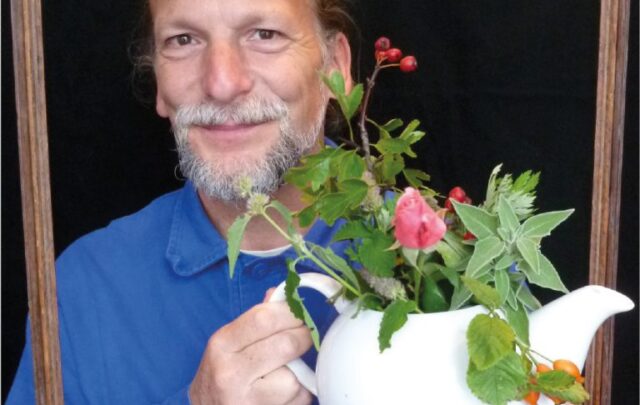Do livestock hold the key to a healthy planet and population? In Bristol on the 23rd November, we held an event to discuss this question. Featuring Joel Salatin, renowned livestock farmer and owner of Polyface Farm in Virginia, USA, the sold-out evening meeting generated inspiration and debate.
Along with Joel, the evening featured a panel of experts including Dr Zoe Harcombe, an expert on public health nutrition, Professor Mark Eisler, Chair in Global Farm Animal Health at the University of Bristol, Simon Crichton, head of the Food, Farming and Trade team at Triodos Bank and Dr Tara Garnett, founder and leader of the Food Climate Research Network. The discussion was chaired by Dimitri Houtart, BBC Rural Affairs and Environment Editor and was organised in partnership with the Cabot Institute.
Joel kicked off the evening with a talk about his farm and his views on the role of livestock. Called “beyond sustainable” by Dr. Harpinder Sandhu in a recent sustainability assessment report, Salatin’s farming style has garnered worldwide attention for its imaginative solutions and innovative practices.
Polyface is a mixed livestock farm, with everything from cattle and pigs to rabbits and poultry. Mimicking the natural patterns of the wild herbivores that once grazed traditional American pastures, Salatin intensively grazes his cattle in a rotation system known as mob grazing. The benefits of this are significant, with higher production levels, high quality, biodiverse pastures and excellent animal health and wellbeing.
But beyond mob grazing his cattle, Salatin integrates every aspect of his farm into a system of mutual benefit. This can be seen, for example, in the way he lets hundreds of laying hens free range across pasture once cattle have grazed it. They eat bugs and worms and scratch out manure, thereby improving the fertility of the pasture and cleansing it of parasites – and he collects thousands of dollars worth of eggs in the process.
Salatin’s approach to farming and his anti-establishment attitude – he has avoided becoming certified organic partly because he refuses to sign up to any kind of government programme – not to mention his engaging speaking style and inventive new terminology (from ‘pigaerators’ to ‘mob-stocking-herbivorous-solar-conversion-lignified-carbon-sequestration-fertilisation’), has garnered him a huge following. The lecture hall was full to capacity, with many attendees having made a significant journey across the UK in order to see him speak.
Salatin’s main message was that we must challenge the orthodoxy that livestock are bad for the environment. Instead, he argued, grazing animals have played a long and important role in our ecosystems and must continue to do so. He claims that if all farmers in the United States adopted his methods, they could bring emissions back to pre-industrial levels through soil carbon sequestration.
But while all speakers agreed that industrial livestock production is unsustainable and damaging, there was some heated debate about the extent to which livestock should form a part of our food system. Dr Tara Garnett, in particular, has consistently campaigned against livestock production due to its environmental impact. Salatin challenged her scientific approach – at one point saying, “We need the poets and the prophets and the liberal arts students to protect us from the amoral machinations of the technicians in the science department,” – while Tara questioned Joel’s ambitious claims, especially regarding the ability of grassland to sequester and store huge amounts of carbon.
Their exchange highlighted the urgent need for more research into the benefits of sustainable livestock. Although farmers can visibly see the impact of their practices, and to some extent know intuitively what is working and what isn’t, more data and science would go a long way in backing up the voices of farmers like Salatin and convincing policymakers to bring about change.
We also heard fascinating contributions from Professor Eisler, who talked about the importance of livestock for poor communities, and from Simon Crichton who explained the need for sustainable and positive investment. Dr Zoe Harcombe also drew great interest with her brilliant overview of the dietary arguments around eating meat. Harcombe pointed to the lack of substantial evidence to back up the claims that meat and dairy is bad for health, and argued instead that we need to eat ‘real food’ and this means a shift away from processed foods, carbohydrates and sugar, and back towards fruit, vegetables and meat.
With a great atmosphere, lively debate and a coming together of people from all backgrounds – including farmers, academics and campaigners – there was a real sense of positive and constructive engagement with the issues at hand. Rather than viewing livestock in the negative light with which they have most recently become associated, livestock should be seen as part of the solution instead of as part of the problem.
Watch the film of the evening’s talks and discussion here:
Further films and write-ups from our other events with Joel Salatin will be published in the coming weeks.
We are grateful to Ridgeview Wine for donating delicious sparkling English wine for the event.





